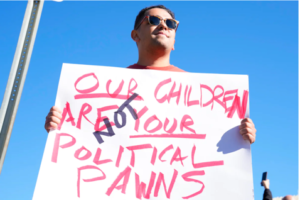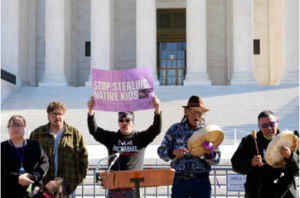
The United States Supreme Court justices are divided over the requirements of the Indian Child Welfare Act of 1978 (“ICWA”). The ICWA gives preference to Native Americans and members of tribes in adopting or providing foster care homes for Native American children. Furthermore, the federal law gives preference to members of a child’s extended family, other tribe members or “other Indian families” in adoptions and if those options are not possible then “non-native” families. The law was passed in response to the high number of Native American children being removed from their homes and placed with non-Native American families.
The justices seemed as though they were not prepared or willing to completely overrule ICWA. The main concern for the Supreme Court justices was whether Congress overstepped its authority in passing the law. The three liberal justices on the Supreme Court stated that such a law was necessary to protect the tribes from extinction. The liberal justices stated that such a law was passed to set federal standards during the process of placement into the foster care system, with the goal of reinforcing tribal connections. Contrarily, the conservative majority questioned whether certain provisions of ICWA could be reconciled with the equal protection clause and other constitutional provisions. Justice Brett Kavanaugh called this issue “difficult” because it is forcing the Court to decide “between two fundamental and critical constitutional values.” He went on to say, “[s]o on the one hand, great respect for tribal self-government, for the success of Indian tribes with Indian peoples with recognition of the history of oppression and discrimination against tribes and people . . . “[o]n the other hand, the fundamental principle we don’t treat people differently on account of their race or ethnicity or ancestry, equal justice under law.”
 This issue came from an action that was first filed in 2017 in Texas courts in which Texas courts declared parts of this federal requirement unconstitutional. The Supreme Court justices heard arguments from a group of non-Native American adoptive families and the state of Texas. The plaintiffs contend that some of the preferences stated in ICWA discriminates against non-Native Americans. In addition, they argue that Congress overstepped its authority to regulate tribal commerce, illegally commandeered state officials to administer federal law, and gave tribes too much power to adjust placement preferences.
This issue came from an action that was first filed in 2017 in Texas courts in which Texas courts declared parts of this federal requirement unconstitutional. The Supreme Court justices heard arguments from a group of non-Native American adoptive families and the state of Texas. The plaintiffs contend that some of the preferences stated in ICWA discriminates against non-Native Americans. In addition, they argue that Congress overstepped its authority to regulate tribal commerce, illegally commandeered state officials to administer federal law, and gave tribes too much power to adjust placement preferences.
The federal trial court judge ruled in favor of the plaintiffs and the Fifth Circuit Court of Appeals affirmed the invalidation of certain parts of ICWA. The Biden administration along with four Native American tribes appealed this ruling to the United States Supreme Court. For the most part, much of the argument is revolved around defining the limitations and powers of Congress over Native American affairs. The prosecutors state that this law is essentially treating children as “property.” The defenders of the law are stating that singling out “Indians” in the law is proper under the Constitution and Supreme Court precedents.
The Court will have a ruling on the case by June 2023.




 This issue came from an
This issue came from an